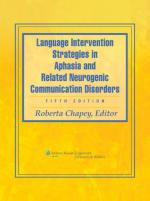|
This section contains 749 words (approx. 3 pages at 300 words per page) |

|
A condition, caused by neurological damage or disease, in which a person's previous capacity to understand or express language is impaired.
In aphasia, the ability to understand language and to translate thoughts into words has been impaired by injury to the brain. Speaking, listening, reading, or writing capabilities may be affected depending on the type of aphasia involved. In children, head injuries, cerebral tumors, brain infection, or other neurological diseases are the most common causes. (Aphasia is also common among older adults, caused primarily by stroke, brain tumor, or degenerative neurological diseases such as Alzheimer's disease.) Aphasia does not include those neurological problems that affect the physical ability to speak or perform the linguistic functions of reading and writing. Aphasia affects one's capacity to manipulate speech sounds, vocabulary, grammar, and meaning. The understanding of aphasia has been enhanced by the development of diagnostic techniques such as magnetic resonance...
|
This section contains 749 words (approx. 3 pages at 300 words per page) |

|


